The Intel Optane SSD 900p 480GB Review: Diving Deeper Into 3D XPoint
by Billy Tallis on December 15, 2017 12:15 PM ESTAnandTech Storage Bench - Light
Our Light storage test has relatively more sequential accesses and lower queue depths than The Destroyer or the Heavy test, and it's by far the shortest test overall. It's based largely on applications that aren't highly dependent on storage performance, so this is a test more of application launch times and file load times. This test can be seen as the sum of all the little delays in daily usage, but with the idle times trimmed to 25ms it takes less than half an hour to run. Details of the Light test can be found here. As with the ATSB Heavy test, this test is run with the drive both freshly erased and empty, and after filling the drive with sequential writes.
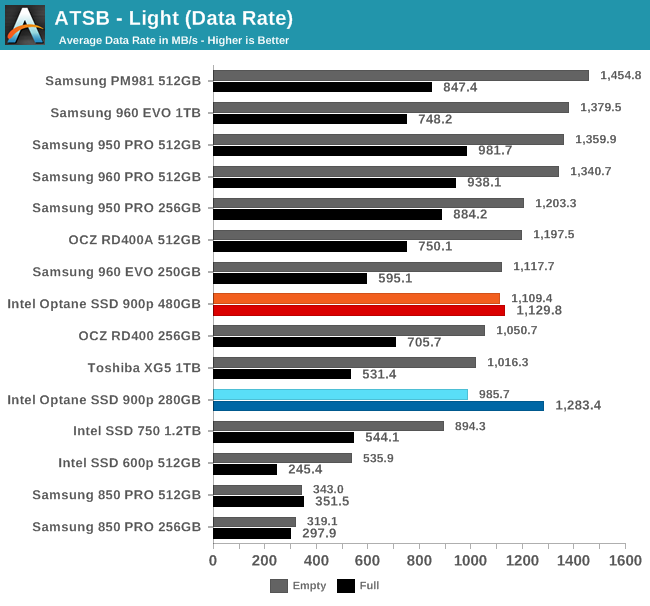
The Light test shows much greater differences between full and empty drive performance, for both flash SSDs and for the rather variable 280GB Optane SSD 900p. The 480GB model shows less variation in its average data rater between the full and empty runs. Overall, the Optane SSDs outperform a full flash-based SSD but are unimpressive compared to a fresh out of the box flash-based SSD.
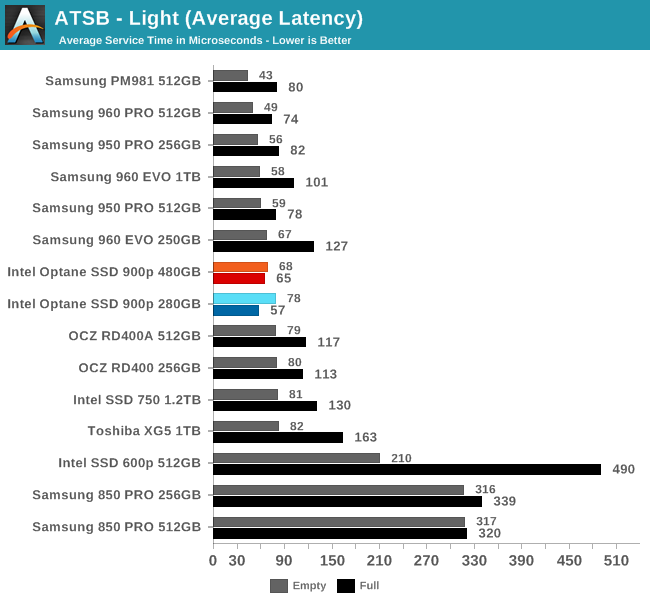
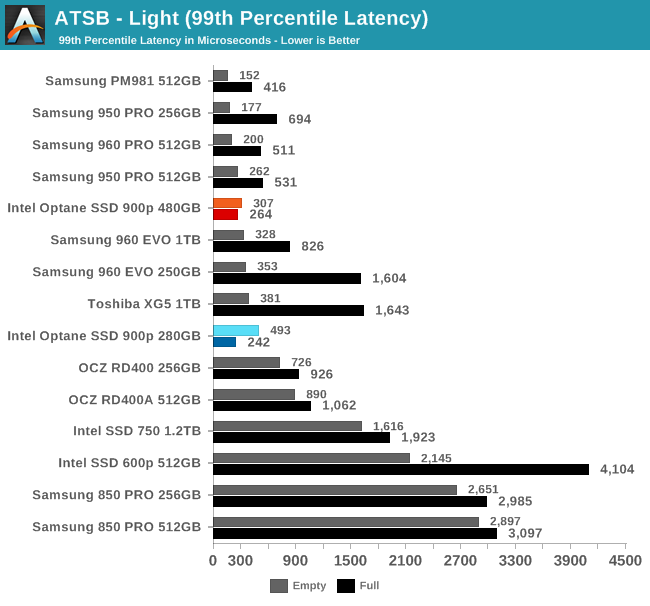
Aside from the different behavior of full vs empty, the average and 99th percentile latency scores of the Optane SSDs are not too interesting. The best-case performance is not quite as fast as the best from a flash based SSD, but once the flash drive is slowed down by being full, the Optane SSD shows a meaningful latency advantage.
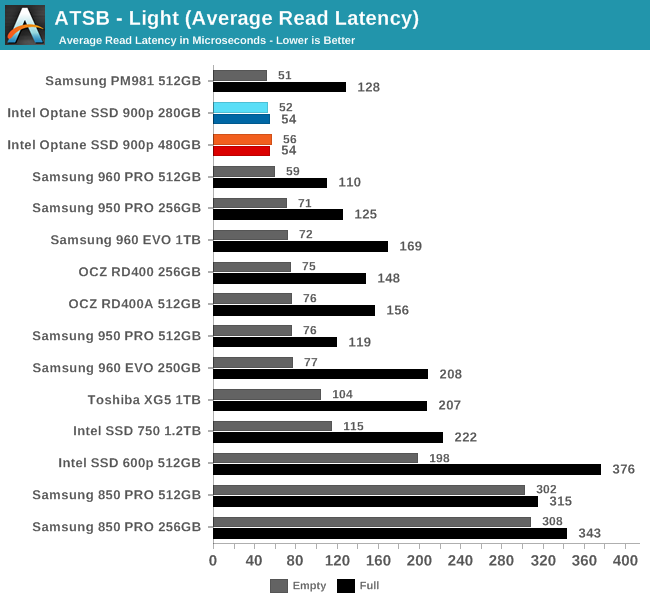
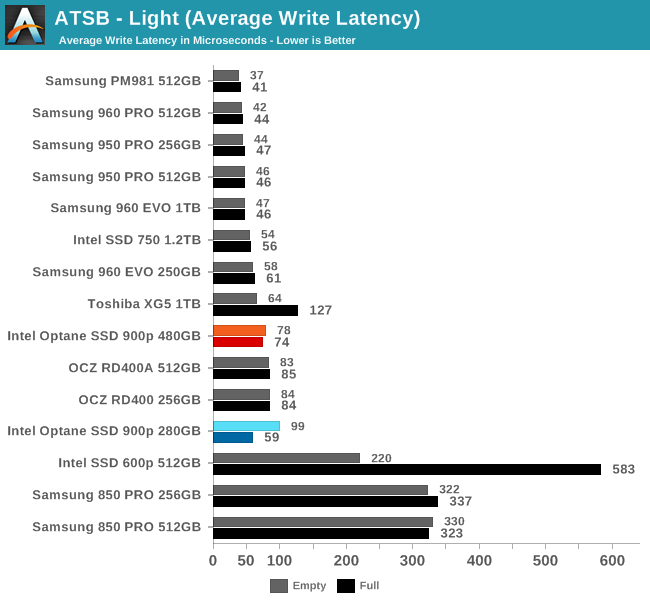
The average read latency of the Optane SSDs on the Light test is not hurt by filling the drive, giving it much better latency in the worst case scenario than any flash-based SSD. When the Light test is run on freshly-erased drives, the Optane SSD's average read latency is about the same as the best flash-based drives. Neither Optane SSD sets a record for average write latency, and Samsung's fastest NVMe drives have a clear advantage.
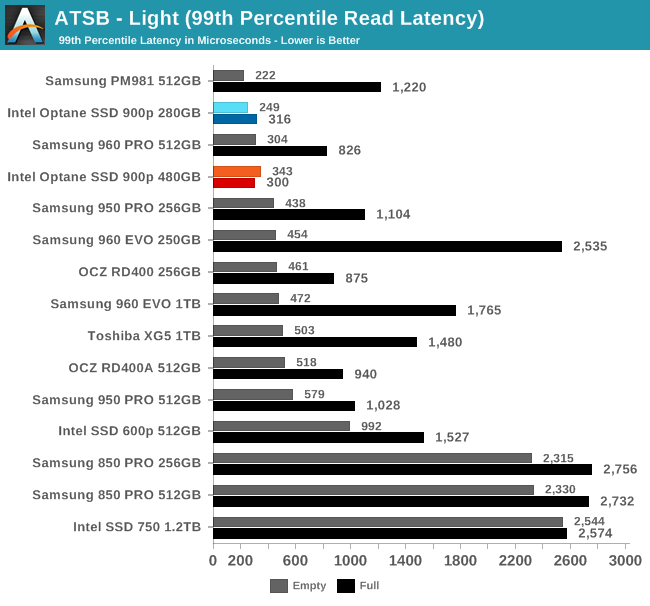
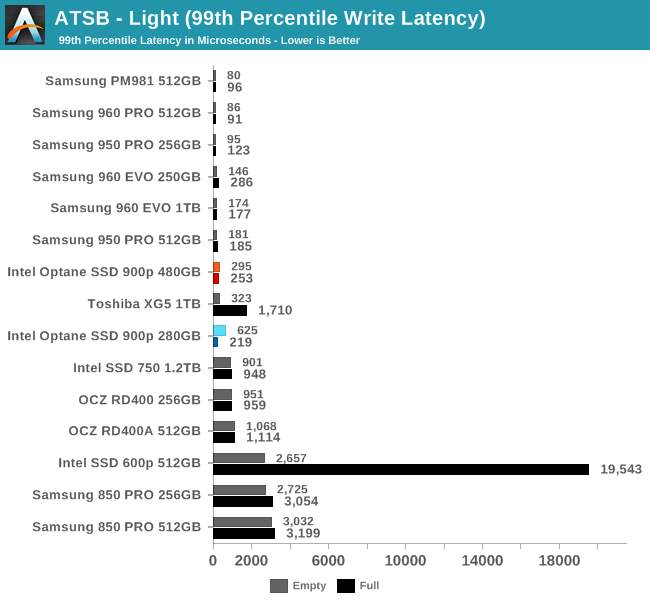
As with the average read latency, the 99th percentile read latency of the Optane SSDs on the Light test only impresses when compared to the performance of flash-based SSDs in unfavorable conditions like being completely full. Otherwise, the Samsung PM981 performs just as well, and the 960 PRO isn't far behind. The 99th percentile write latency of the Optane SSDs is clearly worse than Samsung's top NVMe SSDs.
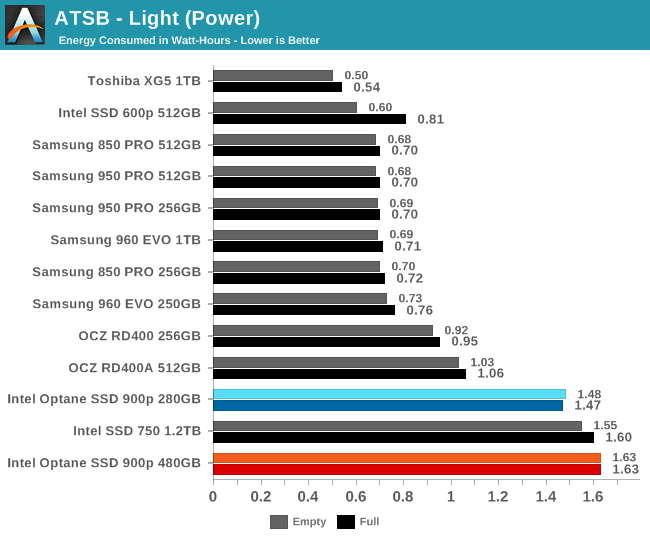
The Optane SSD 900p again requires much more energy than most NVMe SSDs, and the larger Optane drive requires significantly more power—three times as much as the most efficient NVMe SSD we've tested.










69 Comments
View All Comments
Billy Tallis - Friday, December 15, 2017 - link
The ATSB tests are Windows-based, and the synthetic tests are on Linux with fio. I can't really create a RAM disk large enough to properly run the ATSB tests (at least not on this system), but I'll look into running the synthetic tests against a RAM disk.tuxRoller - Saturday, December 16, 2017 - link
Thanks so much for the response and clarification.I'll keep an eye out for that ramdisk comparison:)
Chaser - Friday, December 15, 2017 - link
In other words, if you are the enthusiast gamer person like many of the people that read this site, you're throwing money away buying this for your gaming system.jabber - Friday, December 15, 2017 - link
You are pretty much throwing away money investing in anything faster than a 850EVO in a gaming rig.eek2121 - Sunday, December 17, 2017 - link
Not really, as a gamer, you should not only be looking at performance, but at reliability as well. Ironically I say this NOT because the 8xx EVO is crap (my 840 evo still has 93% life left and that's despite being used as a system drive for many years), but because my 960 evo has had a metric ton of degradation in the 6 months I've owned it.Klimax - Sunday, December 17, 2017 - link
Only if one has few games. There's better solution: 16GB of RAM + large regular HDD (WD Black and similar, their sequential reads are very good). Only initial load will be noticeable. (Anytime after that, caching will take care of that)CheapSushi - Friday, December 15, 2017 - link
Umm, what? Optane would be the better drive in every single way for OS and general usage. If you were going to get ONE main drive, it should be Optane.ddriver - Friday, December 15, 2017 - link
Sure, but is 0.01% faster in real world performance worth being 300$ more expensive? If you are going with one main drive, you better get better capacity than performance you can't make any use of.tricomp - Saturday, December 16, 2017 - link
Here is what Tom wrote about Optane OS drive : "You will see and feel a performance benefit just by using the Optane SSD 900P as your operating system drive. The feel of the system changes even if you’re replacing a high-performance NVMe SSD. You will notice the increased responsiveness immediately and then gradually become accustomed to it. In our experience, you will take the performance for granted until you work on a slower PC. Then you'll wish it had an Optane SSD." Its main advantage - 4K read performance - makes it OS kingeek2121 - Sunday, December 17, 2017 - link
"Tom" has been gone for a long time. Tom's hardware, much like AnandTech, has simply become a vehicle for Purch Ads (sadly). The AnandTech or Tom's Hardware of today have absolutely nothing to do with the original founders/sites. I don't mean to sound anti-corporate (because I'm not), but Purch has allowed pretty much all of their sites to degrade to the point where they have become irrelevant. I mean no disrespect to any AT folks either. I'm sure they bust their asses off. However, IMO, Purch has taken some very valuable brands and driven them into the ground in a desperate reach for revenue.